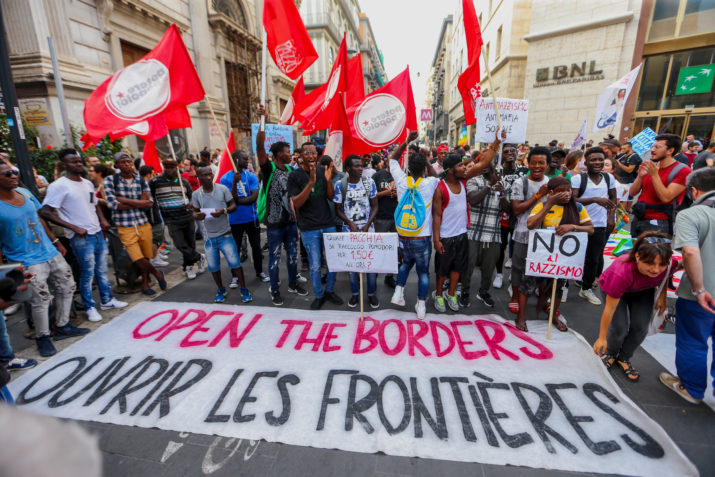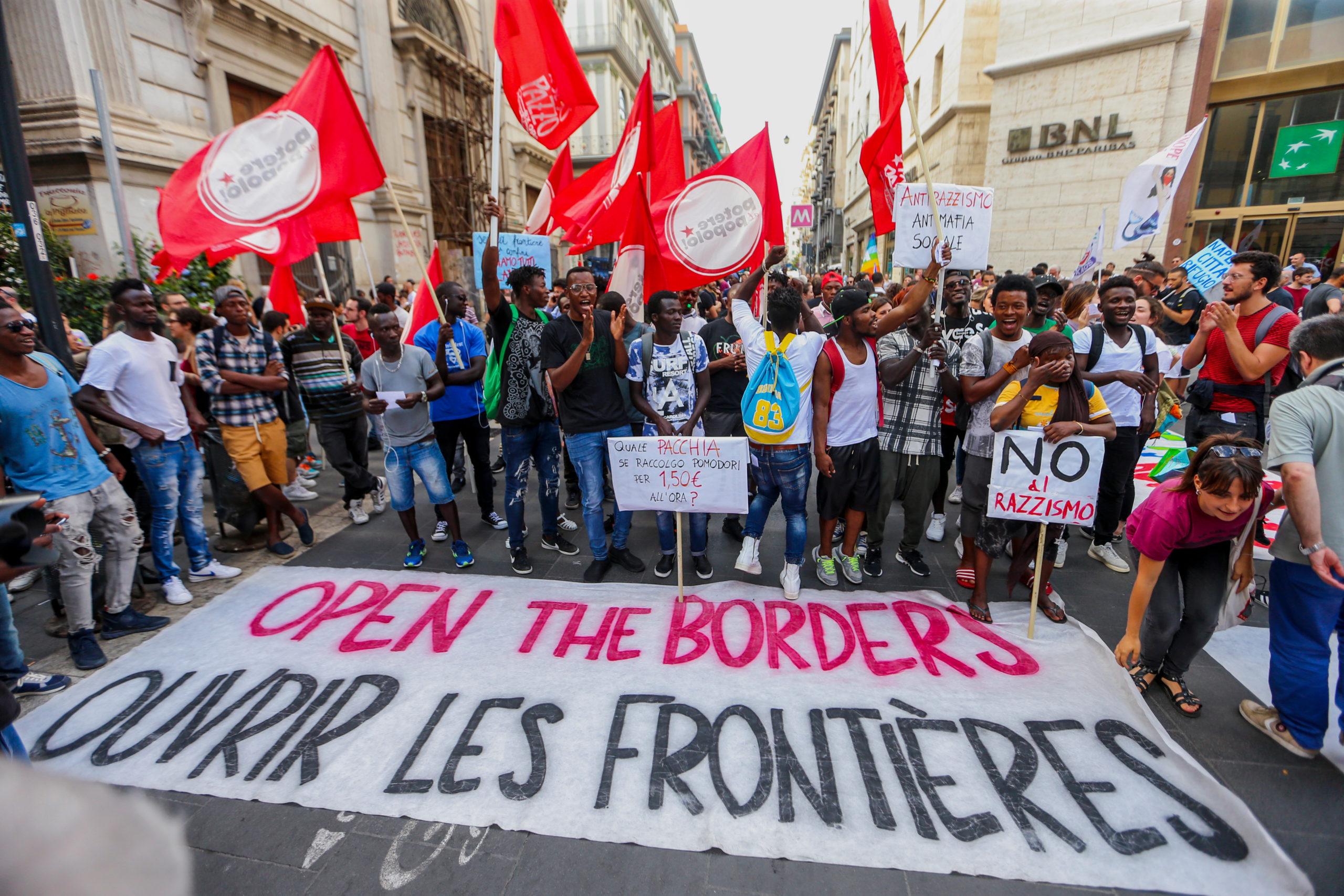

This is part of our special feature, The Politics of Postmigration.
Since 2014, 25,779 people have gone missing in the Mediterranean while trying to reach the shores of Europe.[i] Amidst debates about migrants drowning, far-right nationalisms, and the 2015 “migration crisis,” few observers have missed the political pertinence of migration in Europe. Over time, the Mediterranean deaths of thousands of black and brown people have increasingly been relegated to second page news articles across Europe. In early 2022, the topic of migration reemerged in Europe following Russia’s full scale invasion of Ukraine on February 24th. This time, the debate focused on the rapid European political mobilization and welcoming of millions of Ukrainians fleeing their homes. For the first time since its creation in 2002, the EU activated the Temporary Protection Directive (TPD), providing temporary refuge and work permits to Ukrainians in the EU. While the welcoming of Ukrainian refugees has been a positive political development, observers have pointed to a double standard in European migration politics (Garcés Mascareñas 2022; Bayoumi 2022). Since February 2022, instances of racist treatment toward racialized students, citizens, and migrants from the Global South fleeing Ukraine have been documented and denounced by the UNHCR, African heads of state, activists, journalists, and scholars (Hegarty 2022; Samuelson 2022; UNHCR 2022). Journalists and activists have taken to Twitter to call out the racism embedded in much reporting on Ukraine by US and European news outlets (ibid). Daniel Hannan’s (2022) article “Vladimir Putin’s monstrous invasion is an attack on civilization itself” serves as a poignant example. Indeed, the article reads “They seem so like us. That is what makes it so shocking. Ukraine is a European country […]” (Hannan 2022). While Ukrainians have long been present in Western Europe, Ukrainian refugees have recently become politically constructed in media outlets as “civilized,” as opposed to racialized migrants, predominantly from the Global South (Augostová 2022; Bayoumi 2022). As Karolína Augostová (2022) notes, the European response to the Ukrainian refugee crisis calls for critical engagement with the history of racism and discrimination in European migration politics.
The discussions on race/ism emerging as a result of Russia’s full scale invasion of Ukraine have fed into a conversation on racism and migration in Europe that started in 2020, following the brutal police killing of George Floyd (shortly after the murder of Ahmaud Arbery and police killing of Breonna Taylor) in the US. While racism has long been a reality for Europeans of color, the debate around European legacies of race/ism gained new currency in light of the 2020 Black Lives Matter (BLM) protests. In 2020, statues connected to the transatlantic slave trade and European colonialism were defaced, removed, and brought into public debate across both Europe and the US (Araujo 2020; Nasar 2020). In June 2020, BLM activists toppled the statue of colonial slave trader Edward Colston in Bristol (UK) and dumped it in the Avon River. The removal ignited a nationwide discussion on the historical narratives of the slave trade and empire in Britain (Andrews 2021; Nasar 2020). Similarly, activists in Belgium defaced statues of King Leopold II, the vicious colonial ruler responsible for the death of between six to eight million people (between 1896 and 1906) in present day Democratic Republic of the Congo (Goddeeris 2020). While statues celebrating the Nazi and fascist regimes in Europe have been long removed, those commemorating Europe’s colonial past only came into public debate in recent decades. Following ardent BLM protests, some statues were removed across Europe in 2020. However, in Belgium, statues of King Leopold II still stand in several places (Araujo 2020; Rannard and Webster 2020).
Armed with queries about colonialism, race/ism and empire, in relation to European migration politics, my colleague Eline Westra (University of Amsterdam) and I, assembled the online webinar series Bridging Race and Migration Studies: Scholarship in between, on and beyond the Borders in 2021.[ii] Hosted by the Amsterdam Center for European Studies (ACES), with the support of the Institute for Ethnic and Migration Studies (IMES), the series discussed the historical bridges and divides between critical race and migration studies in Europe. More particularly, it explored why continental European migration studies traditionally lacks critical engagement with the lasting global effects of empire and colonialism (Bhambra 2020; Favell 2022; Kinnvall 2015; Mayblin and Turner 2020).Throughout the series, stretching from January to June 2021, we welcomed Fatima El-Tayeb (University of California San Diego), Amade M’charek (University of Amsterdam), Tobias Hübinette (Karlstad University), Alyosxa Tudor (SOAS University of London), Barak Kalir (University of Amsterdam), and Betty de Hart (Vrije Universiteit Amsterdam), for five webinars exploring the histories of critical race and migration studies in Europe. In this short reflection, I discuss the place of race/ism and colonialism in European migration studies today in relation to key takeaways from the Bridging Race and Migration series.
Institutional histories and race in Europe
Historically, European migration studies has focused on questions of labor markets and economics, national identity, social cohesion, migrant settlement, integration, and state sovereignty (Baas and Yeoh 2019; Brettell and Hollifield 2015; Favell 2022; Gabaccia 2015). Simultaneously, migration studies has been shaped by its national context, the “color-blindness” reigning in France, the focus on ethnicity over race in Germany, or the political taboo surrounding the term “race” in the Nordic countries. While the study of migration has grown out of policy issues such as (im)migration and integration, the study of race/ism has (similar to gender and sexuality studies) been driven by social activist and minority scholars with close ties to anti/decolonial and anti-racist activism (Erel et al. 2016; Favell 2022; Mayblin and Turner 2020). From the fields of black studies, critical race studies, literary critique, postcolonial, gender, and sexuality studies, scholars (predominantly queer and scholars of color) have insisted that migration to (and within) Europe cannot be disconnected from histories of colonialism (Andrews 2021; El-Tayeb 2011; Gilroy 1993; Hall and Morley 2019; Mayblin and Turner 2020; Tudor 2018; 2019). Mainstream migration scholarship has been slow to incorporate these insights and (part of) the field has only recently engaged with the interconnections between race/ism, (post)colonialism, and migration, thanks to critical scholarship.
The place of race in European migration studies is tied to research funding and institutional university politics. Histories of institutional erasure of scholarship examining race and racism across European universities thus had important bearing on the seminar series, particularly given the history of critical race studies at the University of Amsterdam. In 1984, the Center for Race and Ethnic Studies (CRES) was founded there under the direction of Chris Mullard, one of the first black professors of Ethnic studies in Europe. The CRES was dedicated to the critical study of race in relation to other social categories, such as gender and class (Essed and Nimako 2006). In 1991, the institute closed after losing its home at the Faculty for pedagogy. Closely thereafter, IMES was founded by native white Dutch scholars to focus on policy-oriented research, privileging research on ethnicity, multiculturalism and integration, rather than the politics of colonialism, race, and racism in Europe.
The history of the CRES echoes similar stories of institutional erasure―and resistance toward―critical studies of race/ism across Europe. During the series, Tobias Hübinette shared a similar experience when attempting to establish a critical race course in 2020 at Karlstad University, Sweden. At its launch, the course—which is still taught—was met by media debate regarding the use of the word “race [ras]” within a course at a Swedish university. It sparked a nationwide debate among academics, journalists, and politicians arguing that the Swedish word for race was inappropriate and evoked racial-biological thinking (Fardipour 2020; cf. Hübinette 2013; Hübinette and Lundström 2014). As Amade M’charek noted in conversation, the word “race” is similarly charged in many European languages. Speaking of “race” (rather than ethnicity, religion, or culture) evokes a possible reference to—and recognition of—the existence of biologically separate human races (Brännström, 2018; Goldberg, 2006; Möschel, 2011). In turn, the fear of speaking about race is tied to Europe’s history of Nazism and fascism.
Interrogating European dis/continuities
The German word koncentrationslager (concentration camp) has a history stretching beyond the Holocaust (Bilé 2016). The term first appeared in 1905, in an official telegram by the chancellor of the German Empire in reference to the encampment (for slave labor) of the Herero population (residing in an area that is Namibia today). Similar to Jews, Romas, Sintis, and other minorities in Holocaust extermination camps, the Herero population was branded with tattoos marking people as GH: Gefangener Herero (captured Herero), which ensured their prompt return to the labor camps, should they escape (ibid). Several scholars have shown that the Holocaust was not an isolated historical atrocity, but formed part of historical European genocides stretching across the globe (cf. Andrews 2021; Bilé 2016; Lindqvist 1996). Histories of colonialism and empire have been central to shaping contemporary Europe. However, European migration studies have traditionally failed to recognize how empire and colonialism have shaped migrations to and within Europe (Bhambra 2020; Mayblin and Turner 2020). For critical scholars of empire, colonialism and migration, the omissions of critical engagement with colonialism in traditional migration scholarship is deeply ingrained in European knowledge production. These scholars argue that European histories of knowledge production are deeply invested in what Peo Hansen (2002) refers to as the “canonized frames of reference” of Europe.
For Peo Hansen (2002, 2004), the canonized narrative of Europe is one of post-war European integration that lacks critical engagement with Europe’s colonial past. As Gurminder K. Bhambra (2009) remarks, the history of contemporary Europe is largely told in relation to WWI and WWII, the Marshall plan, the Cold War, and the Holocaust, which have inherently shaped European history. This narrative centers the unraveling of an old conflict-ridden European order for a new one, defined by coexistence and democracy, while consigning European imperialism(s) to its margins. In this version of the past, Europe is constructed around an internalist version of history, where the continent exists in relation to itself and to the US (see further: Chakrabarty 2007; El-Tayeb 2011; Hall 2019). Subsequently, this version of history entails the erasure of intellectual traditions in the colonies, predating the enlightenment (cf. Andrews 2021). In minimizing the historical horrors of colonialism, Europe can be narrated as a beacon of human rights and liberal democracy, while colonial genocides are demoted to the fringes of history.
In the wake of the atrocities of the Holocaust, European scholars wished for race as a scientific, social, and political category to evaporate (Goldberg 2006). In 1969, UNESCO published Four statements on the race question, a collection of reports prepared throughout the 1950s and 1960s to debunk the concept of race as a scientific term. The reports were part of a larger political movement aimed at removing race as an analytical category from both the natural and social sciences in Europe (UNESCO 1969; Möschel 2011). In the dominant post-war narrative of Europe, race has been relegated to the past and spoken of in relation to the Holocaust but disconnected from European colonial histories (Bhambra 2009; Goldberg 2009; Hansen 2002; Trouillot 1995).While the Holocaust is constructed as belonging to European history―“it transpired on European soil” (Goldberg 2009, 144)—Europe’s colonial past is externalized. Acknowledging the intimate connections between European colonialism and the Holocaust would require recognizing that politics of racial subjugation survived the Holocaust. Acknowledging colonialism as part and parcel of European identities would also require the recognition that colonial legacies continue to shape European identities, border regulations, and the treatment of racialized minorities today.
Building on Hannah Arendt’s (1951) scholarship on the colonial management of “subject races,” Barak Kalir (2019) employs the term “Departheid” to demonstrate how the contemporary inhumane treatment of racialized migrants at European borders stands in direct line with colonial bordering regimes (cf. Kalir 2015, 2019; Kalir and Wissink 2016). Kalir argues that the deportation regime defining European migration control in the twenty-first century must be understood along a historical continuum defined by empire and colonialism. For Kalir (2019), the bordering of Europe has continuously been animated by a moral superiority rooted in fantasies of White supremacy, aimed at keeping populations from the Global South in place, i.e. outside of Europe (Kalir 2019). Departheid, in Kalir’s work, dislocates any notion that European bordering regimes are marked by “progressive, democratic, and liberal values [that] mark the (self-proclaimed) moral position of Western states” (Kalir 2019, 19). Nicholas de Genova (2017) similarly asks if Black and Brown Lives Matter in Europe by engaging with the deadliness of the European border regime. He notes that the dangers of the migration routes across the Mediterranean are often downplayed, because fully engaging with the deadliness of the borders would confront us with the brute racial reality of contemporary Europe. Migration to Europe from the Global South is permissible, but under certain forms. However, Schengen visas are hard to come by (applicants need to prove they are not a so called migration risk), asylum applications can only be lodged from inside Europe, family migration has increasingly been restricted across the continent, and safe migration routes are scarce (cf. Bonjour and Block 2016; Scheel 2018).
Moving forward
While the Bridging Race and Migration Studies series initially set out to explore the historical bridges and divides between critical race and migration studies, it ultimately came to ask “What is contemporary Europe and who belongs here?” As Fatima El-Tayeb discussed during the series, Europe and Europeanness is not only defined by a specific colonial historical amnesia, but through historical narratives of whiteness, secularity, and Christianity (cf. Balibar 2004, 2009; De Genova 2016, 2017; El-Tayeb 2011, 2013; Goldberg 2006, 2009; Mayblin and Turner 2020; Tudor 2017). Coming back to the question of differential treatment of refugees in Europe over the past years, Alyosxa Tudor’s theorization on racism and “migrantism” (Tudor 2017) illuminates some of the dynamics at play. For Tudor (2017) racism functions through ascribing migrations to black and brown bodies in Europe, positioning Europeans of color as abject and out of place in relation to their white counterparts, regardless of family histories of migration. Rather than being a category of movement, migration, for Tudor (2017, 2019), becomes an analytical and political tool for differentiating those included/excluded within European discourses of belonging. In parallel, migrantism describes the Othering and discrimination experienced by Eastern (and Southern) Europeans in Western/Northern Europe. While shaped by complex political histories between Western- Eastern Europe, and Northern-Southern Europe, discrimination in the form of migrantism differs from racism suffered by Europeans of color.
Understanding migrations to and within Europe implies critically engaging with histories of colonialism, the Holocaust, the world wars (including the Cold War), European integration, European knowledge productions, and the historical treatment of minorities across the continent. The six scholars in the series stressed that contemporary migrations to and across Europe must be understood in relation to European histories of race/ism and colonialism, which are part of European pasts and presents. These questions need to be treated as equally internal and foundational to present-day Europe, particularly in light of rising far right politics across the continent (Ganesh and Froio 2020; Henley 2022; Silver 2022). Engaging with the questions in this lecture series also implies critically examining the lack of political outrage caused by the yearly deaths at European borders. In 2021 and 2022 alone, an estimated 4,427 people lost their lives journeying to Europe.[iii] These deaths are an effect of border controls that over time have increasingly restricted access to European territories for populations from the Global South (Kalir 2019; M’charek 2020). The deaths stand in direct relation to colonial racial hierarchies that have rendered the lives of black and brown populations ungrievable (Butler 2006). Critical engagement with histories of race, migration, and colonialism highlights that the political negligence of thousands of black and brown people dying is not novel to European history. The question of what populations are politically constructed as belonging in Europe has foundational material consequences. It constructs black and brown populations as out of place and less worthy of mourning than those of white Europeans. The lack of mourning is far from incidental. It is a foundational part of European history.
Sonja Evaldsson Mellström is a PhD researcher at the Political Science Department, AISSR, University of Amsterdam. She is a visiting PhD researcher at CRESPPA-Labtop/GTM, Paris and recipient of the 2022 Institut Français (Netherlands) Descartes Scholarship of Excellence for her ethnographic work on the racialized emotional politics of LGBTIQ+ asylum migration in France.
[i] Data collected February 3rd 2023 from IOM’s Missing Migrant Project: https://missingmigrants.iom.int/region/mediterranean
[ii] The 2021 webinar/lecture series “Bridging Race- and Migration- Scholarship in between, on and beyond the borders” was hosted by the Amsterdam Center for European Studies (ACES), and supported by the Institute for Migration and Ethnic Studies (IMES), at the University of Amsterdam. Out of five sessions, three were recorded, and can be found through the ACES YouTube Channel.
[iii]Data collected February 3rd 2023 from IOM’s Missing Migrant Project: https://missingmigrants.iom.int/region/mediterranean
References
Augostová, Karolína. 2022. “Why is Europe suddenly so interested in helping refugees?” Opinion. Aljazeera. March 25, 2022. https://www.aljazeera.com/opinions/2022/3/25/why-are-europeans-suddenly-so-interested-in-helping-refugees
Araujo, Ana Lucia. 2020. “Toppling monuments is a global movement. And it works.
Global demonstrations to remove monuments to slavery and colonialism are retaking public spaces.” the Washington Post, June 23, 2020. https://www.washingtonpost.com/outlook/2020/06/23/toppling-monuments-is-global-movement-it-works/
Baas, Michiel, and Brenda SA Yeoh. 2019. “Introduction: Migration studies and critical temporalities.” Current Sociology no 67, 2: 161–168. https://doi.org/10.1177/0011392118792924
Balibar, Étienne. 2004. We, The People of Europe? Reflections on Transnational Citizenship. Princeton, NJ: Princeton University Press.
- “Europe as borderland.” Environment and Planning: Society and Space no 2, 27: 190-215. https://doi.org/10.1068/d13008
Bayoumi, Moustafa. 2022. “They are ‘civilised’ and ‘look like us’: the racist coverage of Ukraine.” The Guardian. March 2, 2022. https://www.theguardian.com/commentisfree/2022/mar/02/civilised-european-look-like-us-racist-coverage-ukraine
Bhambra, Gurminder K. 2009. “Postcolonial Europe, or understanding Europe in times of the postcolonial.” In Handbook of European Studies. Edited by Chris Rumford, 69–88. London: Sage.
- Foreword: On the Beginnings of Migration: Europe and Colonialism. In Migration Studies and Colonialism. Mayblin, Lucy, and Joe Turner, 7-10. Cambridge, MA: Polity Press.
Bilé, Serge. 2016. Noirs dans les camps Nazis. Monaco: Groupe Artège.
Bonjour, Saskia, and Laura Block. 2016. “Ethnicizing Citizenship, Questioning Membership.
Explaining the Decreasing Family Migration Rights of Citizens in Europe.” Citizenship Studies, no 20, 6–7: 779–794.
Brettell, Caroline B., and James F Hollifield. 2015. Introduction: Migration Theory. Talking Across Disciplines. In Migration Theory: Talking across Disciplines. 3rd edition. Edited by Caroline B Brettell, and James F Hollifield, 1-37. Routledge, New York.
Broberg, Gunnar. 1995. Statlig Rasforskning: En Historik över Rasbiologiska Institutet. Stockholm: Natur & Kultur.
Butler, Judith. 2006. Precarious Life: The Powers of Mourning and Violence. London: Verso.
Chakrabarty, Dipesh. 2008. Provincializing Europe. Postcolonial Thought and Historical Difference. Princeton, N.J: Princeton University Press.
De Genova, Nicolas. 2016. “The European Question. Migration, Race, and Postcoloniality in Europe.” Social Text no 34, 3: 75–102. https://doi.org/10.1215/01642472-3607588
- “The “migrant crisis” as racial crisis: do Black Lives Matter in Europe?” Ethnic and Racial Studies no 41, 10: 1765-1782. https://doi.org/10.1080/01419870.2017.1361543
Delanty, Gerard. 1997. “Models of citizenship: Defining European identity and citizenship.” Citizenship Studies no 1, 3: 285–303. https://doi.org/10.1080/13621029708420660
El-Tayeb, Fatima. 2011. European Others. Queering Ethnicity in Postnational Europe. Minneapolis, MA: University of Minnesota Press.
- “Time Travelers and Queer Heterotopias: Narratives from the Muslim Underground.”The Germanic Review: Literature, Culture, Theory no 88, 3: 305-319.
Erel, Umut, Murji, Karim, and Nahaboo, Zaki. 2016. “Understanding the contemporary race–migration nexus.” Ethnic and Racial Studies no 39, 8: 1339–1360. https://doi.org/10.1080/01419870.2016.1161808
Essed, Philomena, and Nimako, Kwame. 2006. “Designs and (co)incidents: Cultures of scholarship and public policy on immigrants/minorities in the Netherlands.” International Journal of Comparative Sociology no 47, 3–4: 281–312. https://doi.org/10.1177/0020715206065784
Favell, Adrian. 2022. “Immigration, integration and citizenship: elements of a new political demography” Journal of Ethnic and Migration Studies no 1, 48: 3-32. https://doi.org/10.1080/1369183X.2022.2020955
Fardipour, Odessa. 2020. ”Kurs i rasstudier väcker starka reaktioner.” ETC: Kultur & Nöje. May 6, 2020. https://www.etc.se/kultur-noje/kurs-i-rasstudier-vacker-starka-reaktioner
Gabaccia, Donna R. 2018. Time and Temporality in Migration Studies. In Migration Theory: Talking across Disciplines. 3rd edition. Edited by Caroline B Brettell, and James F Hollifield, 1-37. Routledge, New York.
Ganesh, Bharath, and Caterina Froio. 2020. “A “Europe des Nations”: far right imaginative geographies and the politicization of cultural crisis on Twitter in Western Europe.” Journal of European Integration, no 42, 5: 715-732.
Garcés Mascareñas, Blanca. 2022. “Why This Refugee Crisis is Different.” CIDOB opinion. no 708. March. 2022. https://www.cidob.org/en/publications/publication_series/opinion/2022/why_this_refugee_crisis_is_different
Gilroy, Paul. 1993. The Black Atlantic. Modernity and Double Consciousness. London: Verso Books.
Goddeeris, Idesbald. 2020. “Black Lives Matter in Belgium (June-July 2020). A Catalyst in Postcolonial Memory?” Rosa Luxemburg Stiftung. Brussel Office. October 6, 2020. https://www.rosalux.eu/en/article/1796.black-lives-matter-in-belgium-june-july-2020.html
Goldberg, David Theo. 2006. “Racial Europeanization,” Ethnic and Racial Studies no 2, 29: 331-364. http://dx.doi.org/10.1080/01419870500465611
- The Threat of Race: Reflections on Racial Neoliberalism.. Malden, MA: Blackwell Publishing.
Hall, Stuart, and, David Morley. 2019. Stuart Hall: Selected Writings: Essential Essays, Volume 2: Identity and Diaspora. Durham, NC: Duke University Press.
Hannan, Daniel. 2022. “Vladimir Putin’s monstrous invasion is an attack on civilisation itself.” Opinion. The Telegraph. February 26, 2022. https://www.telegraph.co.uk/news/2022/02/26/vladimir-putins-monstrous-invasion-attack-civilisation/
Hansen, Peo. 2002. “European Integration, European Identity and the Colonial Connection.” European Journal of Social Theory no 5, 4: 483–498. https://doi.org/10.1177/136843102760513875
- “In the name of Europe.” Race and Class no 45, 3:49–62. https://doi.org/10.1177/030639680404500304
Hegarty, Stephanie. 2022. “Ukraine conflict: Nigeria condemns treatment of Africans.”
BBC World Service. February 28, 2022. https://www.bbc.com/news/world-africa-60555650
Henley, Jon. 2022. “Rise of the far right: will there be an election bonanza for Europe’s populists?” The Guardian. April 9, 2022. https://www.theguardian.com/world/2022/apr/09/far-right-europe-rise-elections
Hübinette, Tobias. 2013. “Swedish antiracism and white melancholia. Ethnicity and Race in a Changing World” A Review Journal no 1, 4. https://doi.org/http://dx.doi.org/10.7227/ERCW.4.1.2
Hübinette, Tobias and Catrin Lundström. 2014. “Three phases of hegemonic whiteness: understanding racial temporalities in Sweden” Social Identities: Journal for the Study of Race, Nation and Culture no 6, 20: 423-437. https://doi.org/10.1080/13504630.2015.1004827
Kalir, Barak. 2015. “The Jewish State of Anxiety: Between Moral Obligation and Fearism in the Treatment of African Asylum Seekers in Israel.” Journal of Ethnic and Migration Studies no 41, 4: 580–598. https://doi.org/10.1080/1369183X.2014.960819
- Kalir, Barak. and Lieke Wissink. 2016. “The deportation continuum: convergences between state agents and NGO workers in the Dutch deportation field.” Citizenship Studies no 20, 1: 34–49. https://doi.org/10.1080/13621025.2015.1107025
- “Departheid: The draconian governance of illegalized migrants in western states.” Conflict and Society no 5, 1: 19–40. https://doi.org/10.3167/arcs.2019.050102
Kinnvall, Catarina. 2015. “The Postcolonial has Moved into Europe: Bordering, Security and Ethno-Cultural Belonging.” Journal of Common Market Studies no 1, 54:152–168. https://doi.org/10.1111/jcms.12326
Lindqvist, Sven. 1996. Utrota Varenda Jävel. [Exterminate all the Brutes] Stockholm, P.A: Nordstedt.
Mayblin, Lucy, and Joe Turner. 2020. Migration Studies and Colonialism. Cambridge
Published on May 1, 2023.




